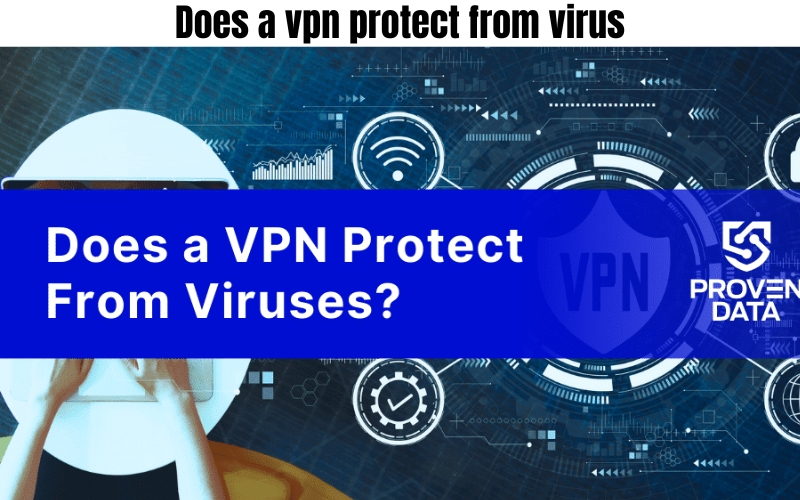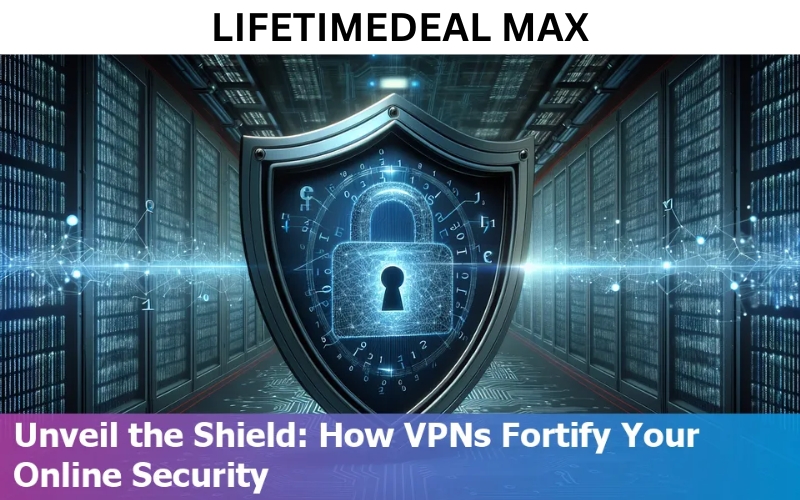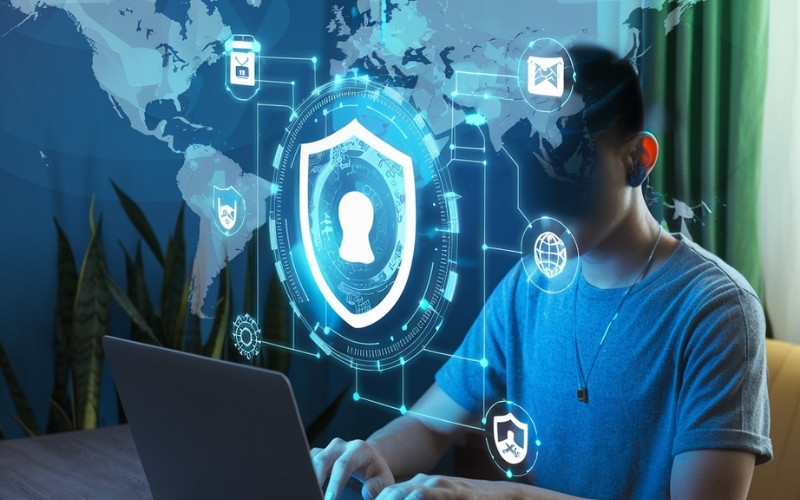Yes, a VPN can enhance online security. It encrypts your internet connection and hides your IP address.
A Virtual Private Network (VPN) improves online security by creating a secure, encrypted connection between your device and the internet. This encryption protects your data from hackers and cyber threats. VPNs also mask your IP address, making online activities anonymous and untraceable.
This is especially useful when using public Wi-Fi networks, which are often less secure. By routing your traffic through secure servers, a VPN ensures your information remains private. Many use VPNs to safeguard sensitive information, enhance privacy, and bypass geo-restrictions on content. Investing in a reliable VPN service can significantly boost your online security.

Vpn Basics
In today’s digital age, online security is more important than ever. Many people ask, “Can a VPN enhance online security?” Understanding VPN basics is the first step. This section will help you learn about VPNs, how they work, and how they can keep you safe online.
What Is A Vpn?
A VPN stands for Virtual Private Network. It is a tool that helps protect your online activities. Here’s what a VPN does:
- Hides your IP address: Your IP address is like your home address on the internet. A VPN masks it.
- Encrypts your data: Encryption scrambles your data. Only the intended recipient can read it.
- Bypass geo-restrictions: Access content is not available in your location.
- Protects on public Wi-Fi: Public Wi-Fi is risky. A VPN makes it safer.
Many people use VPNs to protect their privacy and keep their information safe. VPNs are popular among those who use public Wi-Fi, travel often, or need access to restricted content.
Key Features of a VPN:
| Feature | Benefit |
|---|---|
| IP Masking | Hides your online identity |
| Data Encryption | Keeps your information secure |
| Geo-restriction Bypass | Access to global content |
| Public Wi-Fi Protection | Safe browsing on public networks |
How Vpns Work
Understanding how VPNs work is essential. A VPN uses a process called tunnelling to protect your data. Here’s a step-by-step breakdown:
- Connect to a VPN server: When you start a VPN, you connect to a server run by the VPN provider.
- Encrypt your data: The VPN encrypts all the data you send and receive. This encryption makes it unreadable to anyone who tries to intercept it.
- IP address masking: Your real IP address is hidden. The websites you visit see the IP address of the VPN server instead.
- Data travels through a secure tunnel: Your encrypted data travels through a secure tunnel to the VPN server, where it reaches the Internet.
Imagine your data as a letter. Without a VPN, anyone can read it. With a VPN, the letter is in a secure envelope that only the recipient can open. This process ensures that your online activities remain private and secure.
Using a VPN is like having a personal bodyguard for your internet connection. It keeps you safe from hackers, snoopers, and anyone who wants to steal your data.
Types Of Vpns
Can a VPN enhance online security? The answer is yes. VPNs, or Virtual Private Networks, create a secure connection over the internet. They protect your data and ensure privacy. There are different types of VPNvis available. Each serves a unique purpose and offers various features. Understanding these types can help you choose the best VPN for your needs. for more like this click
Remote Access VPNs
Remote Access VPNs are among the most common types. They allow users to connect to a private network from a remote location. This is especially useful for employees working from home.
Here are some key features of Remote Access VPNs:
- Secure Connection: Encrypts your data, making it difficult for hackers to access.
- Easy to Use: User-friendly interfaces make it simple for anyone to connect.
- Flexibility: Allows access to the company’s network from anywhere in the world.
Many businesses use Remote Access VPNs to ensure their employees can work securely from any location. It also helps in maintaining productivity without compromising on security.
Below is a comparison table showing the benefits of Remote Access VPNs:
| Feature | Benefit |
|---|---|
| Encryption | Protects data from hackers |
| User-Friendly | Easy to set up and use |
| Global Access | Work from anywhere |
Site-to-site Vpns
Site-to-site VPNs are another popular type. They connect entire networks to each other. This is ideal for businesses with multiple locations. It allows different offices to share resources securely.
Key features of Site-to-Site VPNs include:
- Network Integration: Connects multiple offices into a single network.
- Cost-Effective: Reduces the need for expensive leased lines.
- Improved Security: Encrypts data between sites, protecting sensitive information.
Many large organizations use Site-to-Site VPNs to ensure seamless communication between their various branches. This type of VPN is crucial for businesses with a global presence.
Here is a quick overview of the advantages of Site-to-Site VPNs:
| Feature | Benefit |
|---|---|
| Network Integration | Seamless communication |
| Cost-Effective | Saves money on network expenses |
| Enhanced Security | Protects inter-office data |
Benefits Of Using A Vpn
Online security is a critical concern in today’s digital age. Many people wonder, “Can a VPN enhance online security?” The answer is a resounding yes. A VPN, or Virtual Private Network, provides numerous benefits to users looking to safeguard their online activities. This section will explore the key benefits of using a VPN, focusing on enhanced privacy and data encryption.
Enhanced Privacy
One of the primary benefits of using a VPN is enhanced privacy. By masking your IP address, a VPN makes it difficult for third parties to track your online activities. This ensures that your browsing history remains private and secure.
Using a VPN offers the following privacy benefits:
- Anonymous Browsing: A VPN hides your IP address, making your online actions untraceable.
- Location Masking: It appears as if you’re browsing from a different location, adding another layer of anonymity.
- Protection from ISPs: Internet Service Providers cannot monitor your online activities.
Here’s a quick comparison table to illustrate the privacy benefits of using a VPN:
| Without VPN | With VPN |
|---|---|
| IP address visible | IP address hidden |
| Browsing history tracked | Browsing history private |
| Location identifiable | Location masked |
Data Encryption
Another significant benefit of using a VPN is data encryption. VPNs encrypt your data, making it unreadable to hackers and other malicious entities. This encryption secures sensitive information, such as login credentials and financial details.
Key benefits of data encryption with a VPN include:
- Secure Transactions: Financial and personal information remain protected during online transactions.
- Data Protection: Encrypts data transfers, ensuring that intercepted data cannot be read.
- Safe Public Wi-Fi Use: Encrypts data on public networks, preventing unauthorized access.
To summarize the encryption benefits, consider the following points:
- Encryption ensures that sensitive data remains confidential.
- It protects against data breaches and cyber-attacks.
- Enables secure communication over any network.
Incorporating a VPN into your daily internet usage significantly enhances your online security. By providing enhanced privacy and robust data encryption, a VPN ensures that your digital footprint remains safe and secure.
Vpns And Cybersecurity
In today’s digital age, online security is more important than ever. VPNs (Virtual Private Networks) play a crucial role in enhancing cybersecurity. They safeguard personal data and provide a secure online experience. This article explores the relationship between VPNs and cybersecurity.
Protection From Hackers
Hackers are constantly on the prowl for vulnerable targets. They aim to steal sensitive information like passwords, credit card details, and personal data. VPNs offer a robust shield against such threats. Here are some ways VPNs protect you from hackers:
- Encryption: VPNs encrypt your internet connection. This makes it nearly impossible for hackers to intercept your data.
- IP Masking: They hide your real IP address, making it difficult for hackers to locate you.
- Secure Connections: VPNs provide secure connections, especially on public Wi-Fi networks. This prevents hackers from accessing your device.
Here is a table summarizing the benefits of using a VPN against hackers:
| Benefits | Description |
|---|---|
| Encryption | Scrambles data making it unreadable to hackers |
| IP Masking | Hides your real IP address |
| Secure Connections | Protects data on public Wi-Fi networks |
Avoiding Malware
Malware poses a significant threat to online security. It can steal data, damage your device, or even take control of your system. VPNs help in avoiding malware through several mechanisms:
- Secure Browsing: VPNs ensure that your browsing sessions are secure. This reduces the risk of visiting malicious websites.
- Block Ads: Many VPNs come with ad-blocking features. These prevent malicious ads from infecting your device.
- Safe Downloads: VPNs can scan downloads for malware, ensuring that you only get safe files.
Here are some key points on how VPNs help avoid malware:
- VPNs provide a secure browsing environment.
- They block suspicious ads.
- They scan downloads for safety.
Using a VPN significantly reduces the risk of malware attacks, ensuring a safer online experience.
Limitations Of Vpns
Using a VPN can boost your online security. However, VPNs also have limitations. Being aware of these limitations helps you make informed decisions. Let’s explore some common drawbacks of VPNs.
False Sense Of Security
A VPN can give you a false sense of security. Many people believe that a VPN makes them invincible online. This is not true. A VPN encrypts your data and hides your IP address. But it doesn’t protect you from all threats.
Here are some points to consider:
- Malware: A VPN does not protect you from viruses or malware. You still need a good antivirus program.
- Phishing Attacks: A VPN cannot stop phishing attacks. Be cautious about emails and links.
- User Behavior: A VPN cannot protect you from your actions. Sharing personal info online is still risky.
Many users think they are 100% safe with a VPN. This false sense of security can lead to careless behaviour. Always combine a VPN with other security measures.
Potential Data Leaks
Even with a VPN, data leaks can happen. VPNs can have vulnerabilities that expose your data. This can happen in various ways:
- DNS Leaks: Sometimes, your DNS requests can bypass the VPN. This exposes your browsing history to your ISP.
- IP Leaks: Your real IP address can leak due to network changes or VPN failures.
- WebRTC Leaks: WebRTC can reveal your real IP address. This is a common issue in browsers like Chrome and Firefox.
To understand this better, see the table below:
| Type of Leak | Description |
|---|---|
| DNS Leak | Exposes your browsing history to your ISP. |
| IP Leak | Reveals your real IP address due to VPN failures. |
| WebRTC Leak | Discloses your IP address through your browser. |
To prevent these leaks, use VPNs with leak protection features. Regularly check for leaks using online tools. Always update your VPN software to the latest version.
Choosing A Vpn
Choosing the right VPN is crucial for enhancing online security. A VPN, or Virtual Private Network, helps protect your data from hackers and prying eyes. But not all VPNs are created equal. You need to look for specific features and decide between free and paid options.
Key Features To Consider
When selecting a VPN, several key features can make a significant difference in your online security. Here are the most important ones to look out for:
- Encryption: Ensure the VPN uses strong encryption protocols like AES-256. This keeps your data safe from hackers.
- Server Locations: A wide range of server locations gives you better chances to bypass geo-restrictions and ensures faster connection speeds.
- No-Log Policy: Choose a VPN that promises not to keep logs of your activities. This ensures your privacy is maintained.
- Speed: High-speed connections are essential for streaming and downloading large files.
- Customer Support: Reliable customer support can help resolve any issues quickly.
Here is a comparison table for some of these features:
| Feature | Importance |
|---|---|
| Encryption | High |
| Server Locations | Medium |
| No-Log Policy | High |
| Speed | Medium |
| Customer Support | Low |
Free Vs Paid Options
Free VPNs may seem appealing but come with limitations. Here are some differences between free and paid VPNs:
- Security: Free VPNs often have weaker security measures. Paid VPNs offer stronger encryption and better privacy protections.
- Speed: Free VPNs usually have slower speeds due to limited server options. Paid VPNs provide faster connections with more server choices.
- Data Limits: Free VPNs often have data caps. Paid VPNs offer unlimited data usage.
- Ads: Free VPNs may show ads, while paid VPNs are ad-free.
- Customer Support: Free VPNs usually lack reliable customer support. Paid VPNs provide 24/7 customer service.
Here is a side-by-side comparison:
| Aspect | Free VPN | Paid VPN |
|---|---|---|
| Security | Weak | Strong |
| Speed | Slow | Fast |
| Data Limits | Limited | Unlimited |
| Ads | Yes | No |
| Customer Support | Poor | Excellent |
Choosing a VPN depends on your needs. Paid options offer more robust security and better features overall.
Vpns For Different Users
In today’s digital world, online security is a top concern. Using a VPN can enhance online security significantly. VPNs, or Virtual Private Networks, create secure connections over the internet. They protect your data from hackers and ensure privacy. There are different types of VPNs for different users. Let’s explore how businesses and individuals can benefit from VPNs.
For Businesses
Businesses face many online threats. A VPN can be a game-changer for them. A VPN secures sensitive business data. It encrypts data and makes it unreadable to unauthorized users. This is crucial for protecting client information and internal communications.
Here are some benefits of VPNs for businesses:
- Secure Remote Access: Employees can access the company’s network securely from anywhere.
- Data Encryption: All data transmitted over the VPN is encrypted.
- Cost-Effective: Reduces the need for expensive private networks.
- Improved Productivity: Remote work becomes safer and more efficient.
For businesses, choosing the right VPN is essential. Here is a table summarizing key features to consider:
| Feature | Importance |
|---|---|
| Encryption Strength | High |
| Number of Servers | Medium |
| Compatibility | High |
| Customer Support | Medium |
| Cost | High |
For Individuals
Individuals can also benefit greatly from VPNs. Privacy is a big concern for many. A VPN hides your IP address and online activities. This means you can browse the internet anonymously. It also protects you from hackers on public Wi-Fi networks.
Here are some advantages of VPNs for individuals:
- Online Privacy: Keeps your browsing activities private.
- Access to Restricted Content: Bypass geo-restrictions to access content from different regions.
- Security on Public Wi-Fi: Protects your data on unsecured networks.
- Avoids Tracking: Prevents websites from tracking your activities.
When choosing a VPN, individuals should consider the following:
- Ease of Use: The VPN should be easy to install and use.
- Speed: Ensure the VPN does not slow down your internet connection.
- Server Locations: More server locations mean better access to global content.
- Cost: Affordable pricing plans are important.
VPNs offer a simple way to enhance online security for both businesses and individuals. They provide a layer of protection that is essential in today’s connected world.

Future Of Vpns
In today’s digital age, online security is crucial. Virtual Private Networks (VPNs) play a vital role in safeguarding our data. But what does the future hold for VPNs? With technology evolving rapidly, the future of VPNs looks promising. They will continue to enhance online security in more advanced ways.
Emerging Technologies
Emerging technologies will shape the future of VPNs. Artificial Intelligence (AI) and Machine Learning (ML) are at the forefront. These technologies will make VPNs smarter and more efficient. They can detect threats in real-time and act quickly to protect data.
Here are some ways emerging technologies will impact VPNs:
- AI-driven threat detection: AI can analyze vast amounts of data. It can identify unusual patterns and detect threats swiftly.
- Improved encryption: Quantum computing will revolutionize encryption. VPNs will use quantum encryption to secure data.
- Faster speeds: 5G technology will enhance VPN speeds. Users will experience seamless, fast, and secure connections.
- Cloud-based VPNs: Cloud technology will make VPNs more accessible. Users can connect from anywhere without compromising security.
Here’s a table summarizing the impact of emerging technologies:
| Technology | Impact on VPNs |
|---|---|
| Artificial Intelligence | Real-time threat detection |
| Quantum Computing | Advanced encryption |
| 5G Technology | Faster speeds |
| Cloud Technology | Increased accessibility |
Trends In Online Security
Online security trends are continuously evolving. VPNs must adapt to these trends to stay effective. Here are some key trends shaping the future of online security:
- Zero Trust Security: This approach assumes no one can be trusted by default. VPNs will integrate Zero Trust principles, requiring strict identity verification.
- Data Privacy Regulations: Laws like GDPR and CCPA are becoming more stringent. VPNs will need to ensure compliance to protect user data and avoid legal issues.
- Rise of IoT Devices: More devices are connecting to the internet. VPNs will need to offer protection for IoT devices, ensuring they are secure from cyber threats.
- Remote Work: Remote work is now the norm. VPNs must provide robust security for remote workers, protecting sensitive company data.
By staying ahead of these trends, VPNs will continue to be essential for online security. They will adapt to new challenges and offer advanced features to protect users.

Frequently Asked Questions
What Is A Vpn?
A VPN, or Virtual Private Network, secures your internet connection by encrypting data and hiding your IP address.
How Does A Vpn Work?
A VPN encrypts your data and routes it through a secure server, masking your IP address and location.
Can A Vpn Protect My Privacy?
Yes, a VPN can protect your privacy by hiding your online activities and personal information from prying eyes.
Is A Vpn Safe To Use?
Yes, reputable VPNs use strong encryption and security protocols to keep your data safe and private.
Does A Vpn Stop Hackers?
A VPN can make it harder for hackers to intercept your data by encrypting your internet traffic.
Will A Vpn Slow My Internet?
A VPN might slightly reduce your internet speed due to encryption, but high-quality VPNs minimize this impact.
Are Free Vpns Reliable?
Free VPNs often have limited features and may compromise your security. Paid VPNs provide better protection and performance.
Can A Vpn Bypass Geo-blocks?
Yes, a VPN can help you access geo-restricted content by masking your IP address to appear from another location.
Do VPNs Work On All Devices?
Most VPNs work on various devices, including smartphones, tablets, laptops, and desktops, offering cross-platform compatibility.
Is A Vpn Legal?
Using a VPN is legal in most countries, but some restrict or ban their use. Always check local laws first.
Conclusion
A VPN can significantly boost your online security. It encrypts your data, hides your IP address, and ensures privacy. This makes it harder for hackers to access your information. Investing in a reliable VPN is a smart step towards safer internet usage.
Enhance your online security today with a trusted VPN service.

